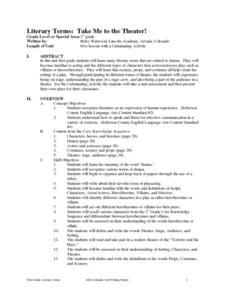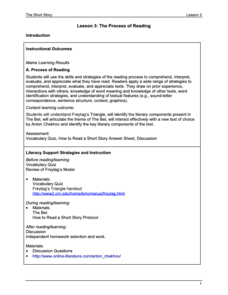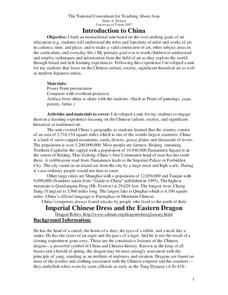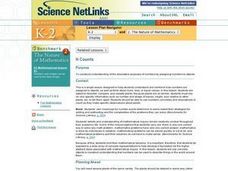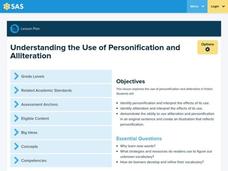EngageNY
Creating Division Stories
Create your own adventure story ... well, not really. The fifth lesson in a 21-part series has pairs create story contexts for division problems. The lesson presents a step-by-step process for pupils to follow in writing such stories.
Curated OER
Literary Terms: Take Me to the Theater!
Take your class to the theater! First graders will examine characters that actors play such a villians and heroes. Then participate in creating plays and performing in them. They will also research what it takes to create scenery, props...
Curated OER
Move It!!!
Students explore motion by observing the movement of people and duplicating those movements. They compare and contrast various kinds of movements and identify different types of movements in pictures. They build an object that can be...
Southern Nevada Regional Professional Development Program
Poetry Aloud/Poetry Out Loud
To appreciate the value of seeing and hearing a poetry performance, groups prepare readings of selected poems and then compare and critique their interpretations and videotaped versions of the same poem. Included in the resource are...
Maine Content Literacy Project
Introduction to Short Story Writers Say
There are so many authors of short stories, and your class can have the chance to study quite a few. This seventh lesson in a series of fourteen continues the decision-making process for the final assessment: a short story author study....
Maine Content Literacy Project
The Process of Reading vocabulary, literary elements
Cover Freytag's Triangle and examine Anton Chekhov's "The Bet" in this third lesson plan in a series of fourteen based around short stories. Learners take a quiz and discuss Freytag's triangle. They apply the triangle to "The Bet" and...
Virginia Polytechnic Institute and State University
Lesson Plan: Successful Microwave Cooking
No need to be involved in a home economics or cooking courses to take advantage of this resource. Not only is there an explanation for how microwaves work but there are also tips for how to use the microwave, and cautions for what not to...
University of Colorado
Is There Life on Earth?
To find life on another planet, scientists look for gases (atmosphere), water, and temperatures that are not extreme. In this activity, groups of pupils become "Titan-ians," scientists who want to explore Earth for possible life forms....
Curated OER
Louisiana's Tragic Hero - "Evangeline"
"Ye who believe...List to a Tale of Love in Acadie." Longfellow's epic poem, "Evangeline," launches a study of tragic heroines, epic poetry, the expulsion of the Acadians from Canada, and their subsequent migration to Louisiana. The...
Curated OER
Introduction to China
Compare and contrast the distinctive characteristics of art forms from various cultural, historical, and social contexts, and describe how the same subject matter is represented differently in works of art across cultures and time...
Curated OER
It Counts
Students classify and compare plants using specific information, observations, and numbers. For this mathematical inquiry lesson, students use plant characteristics to describe, compare, and classify them. They attempt to develop a...
Curated OER
Discovering Language Arts-Intermediate Fiction
Explore the elements of science fiction. Young scholars investigate the literary elements present in science fiction and write their own science fiction stories.
Illustrative Mathematics
Sale!
Everyone loves a sale, and this worksheet allows learners to calculate which sale is more rewarding. The activity can be adapted for different thinking contexts. The answer key describes different answer choices, some being higher...
NASA
Catch a Piece of the Sun
What does the sun mean to you? Learners have many different interests that may have connections to the sun. Whether its solar radiation, solar flares, or solar storms, there are connections to daily interests that may surprise your...
American Statistical Association
Chunk it!
Chunking information helps you remember that information longer. A hands-on activity tests this theory by having learners collect and analyze their own data. Following their conclusions, they conduct randomization simulations to test...
Curated OER
Get the Joke!
Middle schoolers explore humor through word context and inference used in everyday language.
Curated OER
Phrasal Verbs with Get
Young scholars identify ten phrasal verbs with "get". In this phrasal verbs lesson plan, students read and analyze a conversation between two people. Young scholars interpret the meaning of the phrases in the diaglogue. Games and...
Curated OER
Using Authentic Literary Text With Advanced Learners
Students practice reading for the gist of a text, improving reading speed, and fostering interest in reading authentic texts. They explore the use of figurative language.
Curated OER
Charades
Fourth graders play a game. In this vocabulary lesson, 4th graders play the game Charades to help review their vocabulary words. At the end of the lesson students can create their own words to act out.
Curated OER
Fusion: Calligraphy of Thought
Students read about Calligraphy of Thought, a collection of poetry linking Islam to the West. In this art and poetry lesson, students read about the poetry collection and complete a culture flower.
Curated OER
Using a Dictionary
When do we use dictionaries? Provide this dictionary scavenger hunt for your youngsters. Third and fourth graders search for words, recording the number of syllables or definition for a variety of words. Get your class using dictionaries...
Curated OER
Review of Personification and Alliteration
Learners review personification and alliteration. In this literary devices lesson, students use personification and alliteration in a sentence. Learners draw a picture reflecting personification.
Curated OER
Ivan the Fool: Lesson 1
Learners read and analyze a classic Eastern European folktale. In partners, they read the story, take notes, define vocabulary terms, and write a summary of the folktale.
Curated OER
Knowledge Rating Scale Vocabulary Activity #2 Bud, Not Buddy
As your kids read chapters nine through eleven, present them with this vocabulary chart. Nine vocabulary words are shown, and pupils must decide if they know it well, have heard it, or have no clue what it means. Consider re-creating...



